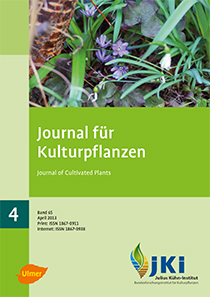Survey on application of chemical pesticides in Germany
DOI:
https://doi.org/10.5073/JfK.2013.04.02Keywords:
Plant protection, statistical survey, treatment index, PAPAAbstract
Freely available information on the actual use of chemical plant protection products (PPPs) in agriculture is highly necessary for a number of scientific questions and political argumentation. Therefore, since 2000, regular surveys of PPPs have been carried out for the most important agricultural and horticultural crops in Germany (NEPTUN projects). Since 2011, they have been continued under different legislative frameworks as PAPA surveys. PAPA stands for panel pesticide applications. A number of crop-specific networks of farms have been created, in which the PPP application data are recorded in detail annually. The data are forwarded in an anonymised form to the Julius Kühn-Institut (JKI).
The crops (winter wheat, winter barley, winter rye, corn, potatoes, sugar beets, apple, hops and vine) were selected for their relevance to the national action plan on the sustainable use of PPPs (NAP). This means, that the individual crop area is not the only important criterion for the selection, but also the intensity of chemical plant protection measures and the associated potential risk to human health and the environment.
All surveys and analyses relate to the Federal Republic of Germany. The distribution of the panel farms was proportional to the distribution of arable land per crop.
As in NEPTUN surveys, the indicators “treatment frequency” and “treatment index” were calculated and rankings of the active ingredients were determined per pesticide group.
Downloads
Published
Issue
Section
License
The content of the journal is licensed under the Creative Commons Attribution 4.0 License. Any user is free to share and adapt (remix, transform, build upon) the content as long as the original publication is attributed (authors, title, year, journal, issue, pages).
The copyright of the published work remains with the authors. The authors grant the Journal of Cultivated Plants, the Julius Kühn-Institut and the OpenAgrar repository the non-exclusive right to distribute and exploit the work.







